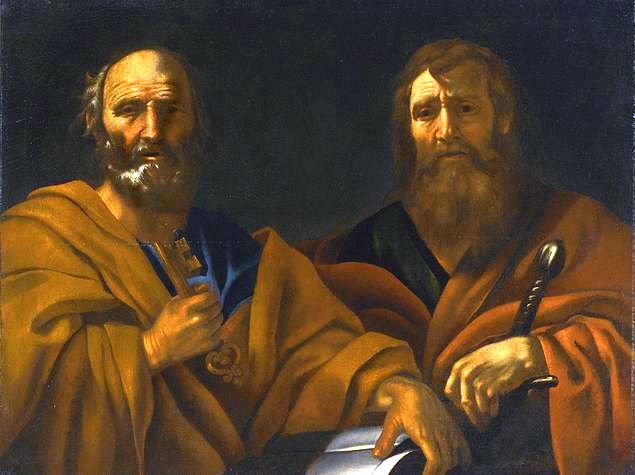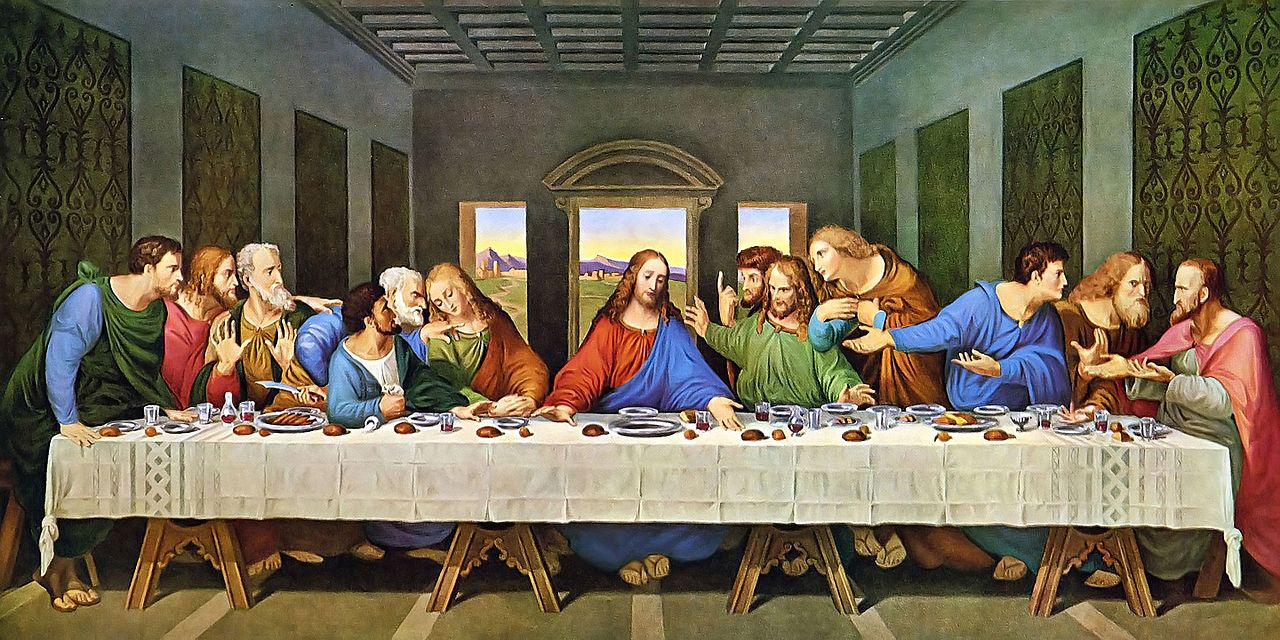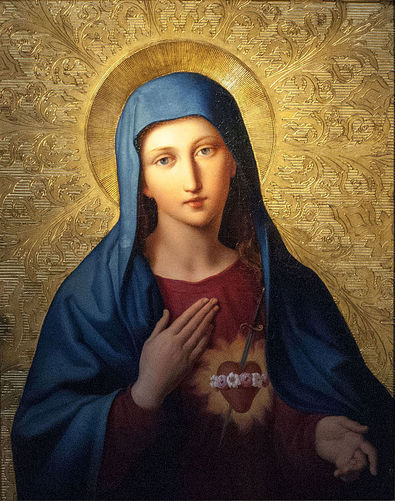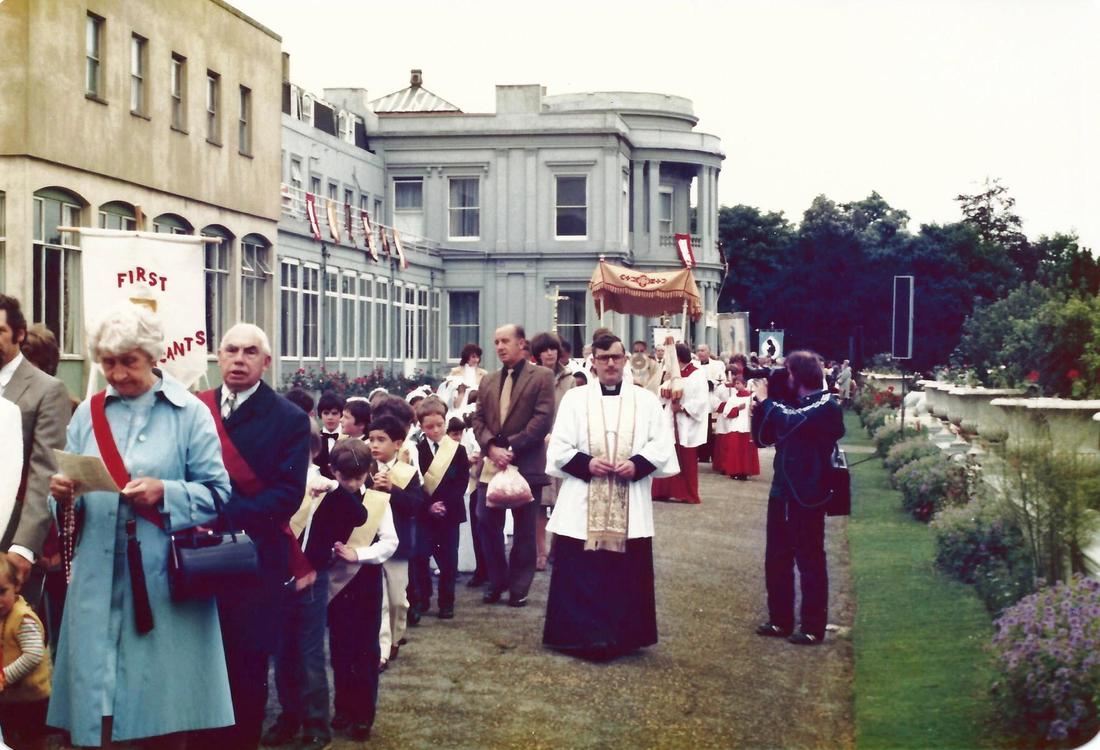|
On Friday, 29th June we celebrated the Solemnity of two great role models for Catholics, Saint Peter, the first Pope (succeeded by our current Pope, Francis) and Saint Paul, Apostle to the Gentiles (i.e. non-Jews). The Church declares this to be a Holy Day of Obligation; we were bound to go to Mass on that day as we are on all Sundays. The word ‘holiday’, (i.e. rest from work) is derived from this term. Centuries ago, Holy Days were the only days off, apart from Sundays, for the poor. Peter and Paul came from relatively ordinary backgrounds. Peter, originally called Simon Bar Jonah (i.e. Son of Jonah), was a fisherman whom Jesus, in recognition of the Pope’s fundamental role of leading the Church and confirming us in the Faith, renamed Peter (Rock, in Latin, Petrus). Initially fearful of those who sought the Death of his Lord and Master and who might well treat His followers in the same way, Peter denied, on the eve of the Passion, even Knowing Jesus! However, on Pentecost Sunday, Confirmed by the Power of the Holy Spirit, Peter would counter a potentially hostile crowd’s mockery, converting three thousand with the Truth! We do not today, generally, risk our lives for correcting error and promoting God’s Laws. Are we prepared, though, to risk our ‘image’ for displaying Moral Courage?!
Paul, previously Saul, was a Pharisee, earning his living as a tent maker. He was firmly convinced that his mission was to stamp out the Christian Faith which was regarded by the Jews as a heresy. His spectacular and sudden conversion (sometimes called his ‘Damascene conversion’), whilst on the road to Damascus to arrest yet more Christians, led to his Baptism as Paul, the fearless Apostle to the Gentiles! We must continually seek his intercession that those who, even today, are convinced that it is their mission to kill ‘in God’s Name’, are brought to discover and accept God’s Truth and turn their zeal to spreading the Gospel of Love. Again, there is so much that our lovingly faithful practice of our Catholic Faith (‘Actions speaking louder that Words’) can do to convert the hearts of those who have been led astray! Both these men, as they made converts and established new Christian communities, wrote follow-up letters (in Latin, 'epistola') to these young cells of the Church over the years, confirming and strengthening them in their Faith and resolving queries or disputes which arose. Saint Peter, charged by Christ with leading the fledgling Church, is credited with two Epistles, while Saint Paul’s writing, as with his missionary travelling, is far more extensive; extracts from his letters feature regularly at Mass. In Peter and Paul’s times, much was passed on by word of mouth as widespread literacy and printing were yet to come. Peter and Paul died Martyrs’ deaths. Peter, like his lord and Master, was crucified; humility moved him to request that he be crucified upside down, as he felt unworthy to die in exactly the same manner as had Jesus. Paul, as a Roman citizen, requested that he be taken to Rome for trial by the Emperor. In agreeing to this request his enemies unwittingly aided his Missionary endeavours. Throughout his lengthy journey to Rome, including being shipwrecked on the Mediterranean island of Malta, Paul seized every opportunity God gave him to evangelise. On reaching Rome, he continued to teach, further spreading the Gospel there, making converts, suffering two terms of imprisonment, and was eventually beheaded during the reign of Nero. As we know, Rome’s central location as what we might, today, term a ‘communications hub’, was to lead to its establishment as the centre of the Catholic world, from where the Head of the Church still governs the now approximately 1.2 billion Catholics around the globe. Just contemplate the wonderful power for Evangelisation by the Church if each and every one of her members actually practises the Faith into which they are baptised! Another of our duties, in Love, is to pray that lapsed (non-practising) Catholics will heed God’s continual Call and return to the Fold! How much do we contribute, through example, to bringing back ‘the lost sheep’? Both Peter and Paul returned that ‘Love unto death’ shown them by Jesus and, in the following centuries, many men and women, drawing courage from their example, would (and, indeed, still do!) lose their freedom and, indeed, their lives on this earth, rather than deny the Truth. Generally speaking, we are probably very unlikely to be asked to make this ultimate Profession of Faith. We may well, however, need to be prepared to face disbelief and even scorn for living as faithful Christians. Are we willing to make the sacrifice, probably not of our life, but of our reputation? Being a Catholic in today’s world can present many a challenge. Take a look at the Ten Commandments then see, in the news and, sadly, in what often passes for the entertainment media, how so many of God’s Laws are openly flouted. One may well be regarded as very ‘uncool’ among one’s peers, for instance, perhaps even among some fellow-Christians, should one manifestly live according to the Moral Teachings of the Church. Should a person have the moral strength to promote these laws and point out how they are so often ‘watered down’ or simply disregarded, they may, paradoxically, be labelled ‘unchristian’. Our First Communicants, the Church of the Future, will, next Sunday, look towards the vital role which they, too, are called to play as they ‘Go Forth’. Let us pray for them and their Parents, that they will not falter in their God-given Mission! Today, though a Sunday, the Church ‘sets aside’ Ordinary Time and focuses our attention on a man who, most certainly, would not have many fans today, rather probably many enemies! During his own lifetime, his preaching of the unchangeable Truth landed him in prison and eventually cost him his life! Saint John the Baptist, whose nativity (or birth) we celebrate today, was truly, as should we all be, ‘a Sign of Contradiction’. Today’s readings emphasise the qualities required of a practising Catholic. John is ‘introduced’, so to speak, in the Entrance Antiphon (John 1: 6-7; Luke 1:17), ‘…He came to testify to the Light, to prepare a people fit…’ for Christ’s Coming. In the First Reading, we hear the familiar prophecy of John’s Mission by the Prophet Isaiah (49:1-6): the Baptist, chosen as the Last of the Prophets, is to preach incisively, cutting through evil like, ‘…a sharp sword…’ penetrating to the Truth like ‘…a sharpened arrow…’. His task is to form God’s Chosen People, equipping them for the mission (in which we are, today, through Baptism, called to join) to be ‘…the light of the nations…’ spreading the Truth world wide. The Responsorial Psalm (Psalm 138: 1-3, 13-15 response v 14)) is a beautiful hymn of praise to our Creator who, ever lovingly watchful, knows us better than we know ourselves, offering us His Grace if we will accept and cooperate with it. The Second Reading (Acts 13:22-26) highlights Jesus’ descent from King David, ‘… a man after my (God’s) own heart…’ and John the Baptist, his humble herald, who was only too aware of his ‘littleness’ before the Lord whose Coming he was announcing. How often is one guilty of the sin of pride in refusing to accept ‘…the way of the Lord…’? The Alleluia Verse (cf Lk. 1:76) quotes John’s father Zechariah’s words (as we may pray them in the Prayer, the Benedictus) again echoing the Old Testament Prophecy of John’s coming Mission.
During the month of June, we are meditating particularly upon the Sacred Heart of Jesus, Source of His Love for us, which calls for our wholehearted Love in return. During July, we will be invited to meditate especially upon His Precious Blood which, in Love, He shed to the very last drop for us on the Cross, so undoing the devastating consequence of Original Sin which had closed to us the Road to Heaven. How appropriate that during June our young First Communicants have been and are to be wrapped in His Loving Embrace as they receive His Body, Blood, Soul and Divinity into themselves, body and soul, for the very first time! This Sunday our second group will, for the very first time, invite the Author of Love to come and dwell in them. They will be followed by the third group on Saturday next. As the month of the Precious Blood of Jesus begins, on Sunday, 1st July, all our new First Communicants will, together, prepare to ‘Go Forth’, living and growing as vital and active members of the Church, sustained by the Bread of Life Himself!
Not so long ago, our Holy Father, Pope Francis, reminded us that we are all called to Evangelise, i.e. to spread, through word and deed, the Liberating Truth of the Gospel far and wide and also, indeed, not so far away, within our own Family Circles and among our Friends. If our Precious Children are to grow into their role as Evangelisers, they must be able to count on the supportive example and help of their Parents, their First teachers in the Faith. Read Pope Francis’ words on this subject here. The crucial role of Practising Catholic Parents in their Children’s growth in and practice of the Faith cannot be overstated! Each and every one of us needs to strive to grow in love of this wonderful Sacrament, receiving Our Lord as often as possible. From this Sacrament will our youngsters, the Church of the Future, draw encouragement as they, Apostles all, face an increasingly (it would seem) Godless world! Please God their loving responses to this awesome Gift will include a firm determination to receive Our Lord as often as they can, certainly on Sundays and Holy Days and also, as they grow older and more able to make such choices, encouraged by their Parents’ example, at weekday Mass during school holidays. If God Incarnate sacrificed His Life for His creatures, the occasional ‘extra’ Mass is not too much to ask of them! June is, for Catholics, the month highlighting our devotion to the Sacred Heart. Last Friday and Saturday, following our recent Celebration of Our Lord’s loving Gift of Holy Communion (i.e. Corpus Christi), we had two more celebrations of Love, sorely needed to highlight the true meaning of Love in an age when what may be termed ‘love’ can be directly opposed to the Will of our Creator. Friday was the Solemnity of the Most Sacred Heart of Jesus, Seat and Symbol of His Burning Love for us. This Love moved Him to Die for us, in agony, on the Cross on Good Friday and had also moved Him, at the Last Supper, to institute the Holy Sacrifice of the Mass. Through Holy Orders and Father’s words and gestures, that once-for-all Sacrifice will be made present and offered in our churches until the end of time. Christ, of course, does not suffer any more; He just wishes us to join ourselves, in our own particular time and place, to His Sacrifice, and longs to give Himself to each of us in Communion. On Fridays, Father may offer a Votive (optional) Mass of the Sacred Heart.
Among the revelations Jesus made was what became known as the Great Promise, namely that those, who on the First Friday of nine months in a row, would receive Communion, would be granted all the Graces they needed to finally repent of their sins, and receive the Sacraments, bringing them safely to Heaven. Of course, as we must recognise, this promise does not guarantee that one will get to Heaven, come what may, any more than having a knowledge of road safety will, if it is not practised, keep us from injury or death. Rather it promises that all the spiritual assistance we need to overcome sin and move closer to God are ours for the asking. We are, of course, expected to make our best efforts to use these sources of help! Jesus asked for the establishment of this Feast, to make up for Man’s ingratitude.
It is significant that these visions occurred when they did because, at the time, a heresy, known as Jansenism, presented God not as Loving, Merciful and Forgiving but, rather, negatively as someone to be feared. Free Will, given to each and every one of us, was replaced by predestination to Heaven or to Hell, something totally at variance with the Church’s Teachings which make it very clear that, far from wishing to exclude us from Heaven, God will not cease to call us to Him until our last conscious moment when we are capable of willing to love Him and go to Heaven. Only our knowing and deliberate choice of evil can separate us from our Loving God. We cannot lose the opportunity to enter Heaven by accident! In an age when the meaning of the word ‘love’ has been so distorted and debased, this Devotion is another priceless asset to us in our journey to Heaven. Last week, we celebrated the Three Divine persons in the One God, i.e. the Most Holy Trinity. Today we celebrate the Sacrament to which all the other Sacraments point the way, Holy Communion itself. Each time we receive Communion, we take to ourselves that same Body, Blood, Soul and Divinity which Christ first gave to His Apostles at the Last Supper and which, as our Risen Lord, He longs, every day, to give to us. This is not to be regarded as a reward for being good, but to strengthen us in our resolve to be good Catholics. One of the descriptions of the Mass is ‘...a public act of worship…’ Another public proof of our adherence to the Fullness of the Faith is how we ‘…love one another…’. Many of us will recall, from our own childhood, that a prominent part of the celebration of Corpus Christi was a public procession around the neighbourhood of our church. Father, accompanied by the Parish First Communicants, their Families and other Parishioners, carried the Blessed Sacrament in the Monstrance, taking Our Lord out to those of all Faiths and none. This very ‘high-profile’ demonstration of our love for and devotion to the Bread of Life is taking place, after a gap of many years, in our Parish today. The Corpus Christi Procession at St. Michael's Convent in 1982* Thanks to the present English translation of the text of the Mass, we can acknowledge, just before receiving Communion, our total unworthiness to have God come into our body and soul. We repeat the words of the Roman Centurion, declaring, “Lord, I am not worthy that you should enter under my roof, but only say the Word and my soul shall be healed.” We not only admit to our fallen human nature, but we proclaim our firm belief that Christ can, in His Goodness, providing that we are truly sorry, drive out the sins which distance (and, sometimes) completely separate us from Him. It is because Jesus, God the Son, actually comes to each of us personally that the Church insists upon our being in the State of Grace, i.e. free from Mortal Sin, requiring us to confess any such sins of which we are aware before approaching the Altar. She requires us, also, under normal circumstances, to fast for one hour (water and medicines are the only exceptions) before receiving Communion. Hopefully, realising the importance of the Food of our Souls, this is no big deal. Decades ago, the fast lasted from Midnight on Saturday; it was then reduced to three hours by Pope Pius XII in 1957, then to the present one hour by Pope Paul VI in 1964. You might like to read the stories of Saint Tarcisius and Little Li, two children who gave their lives as Martyrs for love of the Holy Eucharist. They will inspire you and your children! Why not see how many more Saints of the Eucharist you can discover! If ever one goes unwillingly to Mass and Communion, one will do well to recall that in various parts of the world, our Brothers and Sisters are still risking their lives for this Privilege. Our Procession today will be a clear sign of our gratitude for the freedom we enjoy to practise our Faith in this country, and a sign of Solidarity with our persecuted Brothers and Sisters. Have a Holy and Happy Solemnity! *The picture within the article above depicts the Corpus Christi Procession at St. Michael's Convent in 1982.
This annual event brought together clergy and parishioners from St. Bartholomew's Norbury, English Martyrs Streatham, St. Michael's Pollards Hill and St. Matthew's West Norwood - the convent, at the top of Streatham Common, was originally a mansion called Park Hill. Built in 1829 it was the home of Henry Tate from c.1880. It became a nursing home run by nuns of the the Congregation of the Poor Servants of the Mother of God in 1923. The nuns left the building in 1996 when the property was put onto the market. It was sold in 2002 and the site was developed as Henry Tate Mews. The Grade II* listed building (including the chapel) was sympathetically converted into apartments. |
From St. Bart'sThoughts on the traditional teachings, devotions, seasons and matters of the Catholic Church Categories
All
Archives
November 2019
|
Roman Catholic Archdiocese of Southwark
A Registered Incorporated Charity - CIO No. 1173050
A Registered Incorporated Charity - CIO No. 1173050
|
Accessibility - St. Bartholomew's does its utmost to accommodate those with additional needs. Whilst the main body of the church is wholly accessible to people with mobility disabilities, the choir gallery is both approached by stairs and the seating is then stepped by design. The church has a wheelchair-accessible toilet, and baby-changing facilities. There is a Loop System (AFIL) in place in the church.
St. Bartholomew's Catholic Church cannot be held responsible for the content of links to external sites. To contact the church and our priests, click here. For Website-related matters only, click here. |
Website Copyright © St. Bartholomew's Roman Catholic Church and/or the Roman Catholic Archdiocese of Southwark 2016 - 2025






 RSS Feed
RSS Feed
